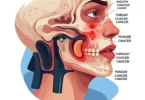What is Chronic Constipation
Chronic constipation develops slowly and can last for months or years with following features:
- Less than 3 bowel movements per week
- Hard stool
- The feeling of incomplete evacuation
- The feeling of an intestinal narrowing
- Effort in the defecation
According to their causes chronic constipation can be divided into three groups, the kologene constipation, the anorectal constipation and idiopathic constipation in which no clear physical cause is found.

Slow Transit Constipation
The collagen constipation is a form of chronic constipation, which also known as slow transit constipation. Due to lack of mobility of the intestine, intestinal contents move slowly. Since water is constantly extracted from intestinal contents, hard stool is produce. Thereby excretion can be delayed for up to two weeks. The following causes may be responsible:
- High fiber diets
- Nerve disorders such. As the nerve plexus of the gut, in the central nervous control or by neurological disorders
- Diabetes Mellitus
- Multiple sclerosis
- Parkinson’s disease
- Scleroderma (disease of the vascular and connective tissue)
- Muscular disorders and connective tissue diseases
- Hormonal influences, z. B. Low thyroid activity (hypothyroidism)
- Dolichocolon (innate overlong Colon> 1.5 m)
- Side effects of medications: remedy for mental illness (psychotropic), sleeping pills, tranquilizers, aluminum-containing stomach acid binders (aluminum sulfate), opiates (. Eg morphine), iron supplements, water pills (diuretics), antihypertensives, anti-Parkinson drugs, antiepileptics, anticholinergics (for urinary incontinence)
Anorectal Constipation
Anorectal Constipation is a form of chronic constipation that result from changes or disturbances in the area of the rectum and the anus. Causes include:
- Narrowing of the anus (anal stenosis)
- Slipping out of part of the rectum tissue from the anus (rectal prolapse, anal prolapse)
- Sac of the rectum (rectocele)
- Congenital thickening of the inner sphincter (internal sphincter)
- Impaired motor function of the rectum (rectum) and after
- Decreased rectal sensibility
- Impaired coordination of the inner and outer sphincters
Idiopathic Constipation
In case of idiopathic constipation, no pathological changes of intestinal function or the intestinal anatomy can be determined medically. This blockage is commonly found. Since no organic cause can be found, this blockage shape is determined on the basis of complaints of the patient and using a transit time measurement. Transit time is the time from admission to the excretion of food. Even a Sigmoidoscope and a Sphinktermanometrie (pressure measurement (manometry) of the sphincter muscle (sphincter)) should be performed in order to secure the diagnosis. Common causes include:
- Arbitrarily suppressed urge to defecate
- Stressors
- Irritable bowel syndrome (with painful constipation)
Travel Constipation
The travel constipation actually counts for kologenen constipation (see above); because they (mostly at the beginning of the trip) occurs limited, it is not among the most chronic constipation. A Sudden constipation can be a result of a change of diet and environment in travel. The body is not familiar with the new situation and responding with a temporary constipation. Causes of trip constipation may include:
- Unfamiliar foods and spices
- Dehydration due to high temperatures and dry air
- Time change when traveling overseas
- Unusual daily flow
Pseudo Constipation
If the intestine is emptied, it may take several days to return normal bowel movement. This is a natural process and not a blockage. Taking a laxative is unnecessary. Reasons for such a defecation can in a change in diet, like diet or previous fasting, lying. Other reasons include severe diarrhea or laxative abuse, but also the previous emptying in intestinal examinations, such as the colonoscopy.
Click here for information about Causes, Symptoms and Treatments.





